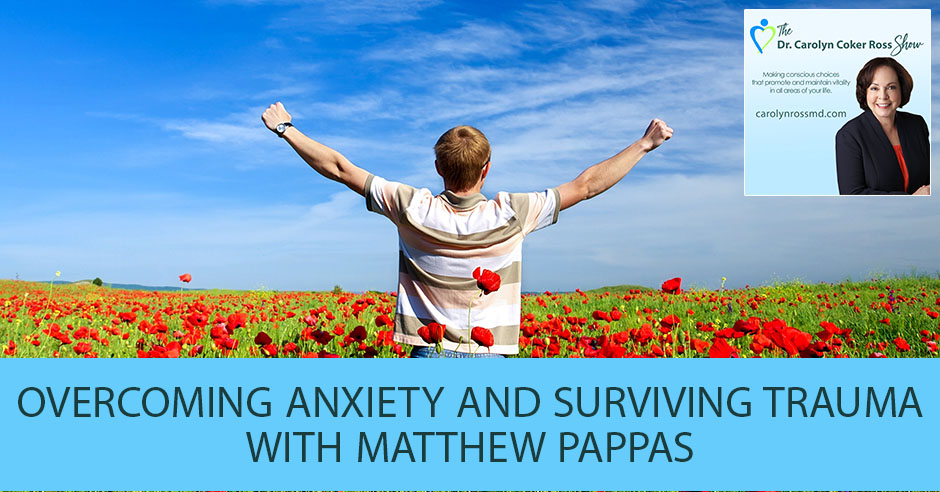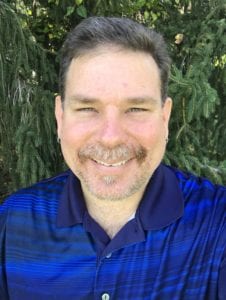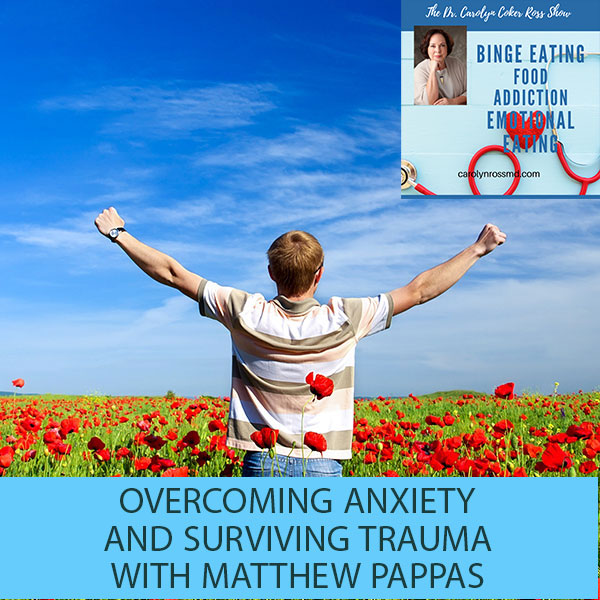
Anxiety and survivor coach Matthew Pappas is a survivor of childhood trauma and, because of this, struggled with food, body image issues, and relationships throughout most of his life. A “light bulb” moment in a therapy session enabled him to recognize how what had happened to him as a child had led to many of his problems. Matthew recounts how he was able to turn his life around. He has now dedicated himself to helping others who have survived trauma in their lives do the same.
—
Watch the episode here:
Listen to the podcast here:
Overcoming Anxiety And Surviving Trauma with Matthew Pappas
I have with me Matt Pappas and we’re going to be talking about the link between childhood trauma and eating disorders. Welcome, Matt.
Thanks for having me on your podcast.
You’re very welcome. Can you tell my audience a little bit about yourself and how you got started doing what you’re doing now?
I’m a certified coach and NLP practitioner. I work with clients one-on-one and in groups mostly online, virtually through things like Zoom. I’m primarily working with those who are trauma survivors and those who are looking to overcome severe anxiety in their lives. We do coaching every single night with a colleague of mine. We do the podcast, which I’m in. I blog, I’m a big advocate for survivors and those who live with severe anxiety. I know what it’s like to live with those things being a survivor myself and dealing with anxiety for quite such a long time. I love what I’m able to do. I feel like now at about 46, I finally found my calling in life.
You did a career change, didn’t you?
[bctt tweet=”Matt shares his experiences learning how to grieve a lost childhood and lost innocence as a survivor of childhood trauma in a way that is validating and offers hope for even the most troubling of circumstances.” username=”CarolynCRossMD”]I worked as an engineer for about seventeen years and I left that career. I’m full-time advocate podcaster, taking a chance and doing what I love. Realizing that the work that you do, the work that I do, that so many of us do is so important. I enjoyed it immensely.
Was there a point in your life when you were an engineer where you had an a-ha moment or something that made you say, “I am not following my passion?”
I started to get the inkling a little bit when I began working with a coach. I had been with a therapist for a couple of years and we had worked on all kinds of trauma. I transition then to working with a coach to take my healing to the next level. To get a different perspective and take where I am now and move forward. It was working through that experience of working with a coach, I began writing my blog and doing a podcast and thinking I like doing this. There are millions of survivors all over the world, way more than millions, who have experienced all types of trauma. It was an overtime thing that started to develop. I appreciate what my career as an engineer did for me for quite a while. It served a purpose and it helped me in a great many ways. It’s time to move on to the next phase of my life, which is working with survivors, working with those who deal with anxiety and realizing that it was time for a change. I wanted to do something that made a difference in the world in somebody’s life, more so as an engineer.
Working with trauma survivors definitely can make a big difference in their lives. Were you aware all along that you had been a trauma survivor or did your memories come later in life?
That’s an interesting thing and for anybody who’s listened to the podcast or read the blogs, I’ll give you the quick synopsis. I was a victim of childhood trauma between five and ten, then I had severe bullying from late elementary all the way through middle school. All growing up after I graduated, I knew something had happened but I didn’t deal with it. I pushed it aside. I didn’t care. It didn’t affect me. I was going to live my life. I was aware but I didn’t deal with it. I didn’t care. I was like, “This is so long ago. This doesn’t bother me. I’ll live my life, I’m fine.” I proceeded down that path for the next three decades, give or take, up until my early 40s when I realized something was going on. All through my teenage years, the twenties, 30s, I was doing my thing.

Body Image Issues: I still had a lot of life ahead of me and I didn’t want to let the dysfunctions of my external life and the internal battles of myself cause me to self-destruct.
When I got to work with a therapist, which wasn’t even about trauma at first, it was because I was divorced and trying to figure out how to pick up the pieces of my life, “Why was I broke in? Why did she leave? What am I doing wrong and how do I fix myself? It started with that and then during a writing assignment and some routine therapy sessions that I had written about being a survivor of childhood sexual abuse. That came out and then that’s what started it down the path of going deep into the healing work that was trauma. I spent a good part of my life pretending it didn’t exist.
Can you expand on the notion of how trauma does affect a survivor’s life? What kinds of things did you start to see in your life when you did start going to therapy? Many people who are trauma survivors are like you. They think, “That happened so long ago. It doesn’t have any effect on me.” Sometimes the signs are very subtle. What were the signs as you were looking back once you started to realize that there was a connection? What were the signs that you were seeing?
There were a lot of things in my life that I was dealing with. All throughout my life I had self-esteem problems, no self-confidence, problems with my weight, learning disability in elementary and middle school. I had to go to one of the special buses or trailers to learn outside of regular class for some of my days. All kinds of attachment issues and things of that nature that plagued me off in all my life. I thought that’s just who I was. I didn’t put any pieces of the puzzle together that it was all coming from childhood trauma until I started working with a therapist and a coach and diving deep into it. All of those things were, can and often do start as a result of being a survivor of trauma. It was all of that stuff and then some that once you start to put the pieces together like, “Now I know why I feel like this, now I know why I struggle with that.” Once you learn it and you understand it, then you can start to put pieces in place to change it. I had all kinds of stuff going on.
I’m very interested in trauma and its effect on our eating and body image issues and so on. What were the things that you learned either from working with your coach or your therapist or even working with the people who you have these groups with about the connection between food and trauma?
There are so many areas. When I was growing up for pretty much most of my life up until about fifteen, sixteen, I had problems with my weight. I had bad acne. I had problems speaking. The way that my parents dressed me when I was young was a tragedy, it was horrible. All of these things were the perfect storm of a way to be bullied and a way to immerse myself in food. I was like, “If you’re going to make fun of me and I can’t seem to change it, I might as well enjoy what I’m doing and be miserable but be happy while I’m doing it.” I had unhealthy eating habits. I would binge on chips, pretzels and ice cream all the time. I had been known to eat a whole pizza by myself and not even think twice about it. All those types of things growing up. Every time I got bullied it was because of something usually regarding my weight or it was my complexion, my speech, my hair, my learning disability, my clothes or whatever. I pretty much retreated that I’m just going to be a recluse and isolate and eat and feel better. As you know, the more you eat, you feel better for a time and then the shaming kicks in.
[bctt tweet=”The whole point of exercise is to feel good enough in the diet world. It is to give yourself the privilege of eating.” username=”CarolynCRossMD”]I went through all of that for up until the middle of high school when I had a light bulb moment. In retrospect, it wasn’t a healthy light bulb moment, but it was for me where I was like, “I’m sick and tired of this. I’m not going to get bullied anymore. I’m going to change myself.” The summer before my junior year I went on this crash diet where I ate almost nothing for three straight months. When I went out of school, I ate almost nothing. I was outside all day running, exercising and so in three months, I dropped 40 pounds. I went to school as a junior with new clothes and a cool haircut. I was like, “I’m taking my life back. I don’t care anymore. I’m not going to eat and that’s how I’m going to lose weight.” It worked because I lost all the weight and that’s not a healthy way to do it. At sixteen I didn’t care, nor did I understand. I was like, “I’ve got to make a change,” and the only thing I can do is stop eating. I did and I went to a dermatologist and all kinds of things. I reinvented myself for the last two years of high school. I wrote a post awhile back called Taking Back My Life where I was like, “I’m not going to let anything bother me. I don’t care. I’m a new guy.” I had an unhealthy relationship with food because I wasn’t eating it.
How long did that last?
I kept up that regimen for the most part up until I was about 21, 22. I was pretty much not eating at all or eating very little for years. It then caught up to me once I got married the first time and I settled in or maybe my body was like, “I’ve had enough.” Then I started eating more and the weight came back on. Then I had struggled with that again and all kinds of shame. It was a yo-yo thing up and down for decades of trying to find my rhythm, trying to find myself again, dealing with shame. My self-confidence was shot again. I got divorced, all went to hell in a handbasket. I had self-esteem issues again and all kinds of things.
You said though that the extreme diet was a wake-up call for you. I understand taking back your life, that desire to want to be more in control, that desire to even step into who you are. It sounds like with your parents stressing you and all of the problems you had then the other issues that you weren’t feeling in control. How was that a light bulb moment for you to take your life back?
I say light bulb moment because oftentimes as survivors, we have these light bulb moments which are usually good things. For this it was my light bulb moment or the only way that I could feel in control again was food was controlling me. I was like, “I’m going to control you. I’m not going to eat. That’s the end of it, you can’t do anything about it because I’m not going to eat.” It was a control thing in retrospect, although at the time I wasn’t putting those pieces together. It was about understanding that food was running my life and the only way that I could figure out being a somewhat naïve teenager is I’m not going to eat. It worked but it wasn’t a long-term solution. It wasn’t addressing the problem, it was addressing the symptom. Oftentimes when we’re young, we don’t think about the long-term consequences. We don’t think about the problems, we’re like, “I need a quick fix, what is that? I’m not going to eat.”

Body Image Issues: Simplicity is what people remember more than complexity.
That’s how eating disorders often start. They can start with the diet and people get all the positive feedback and suddenly, everything looks better because they’ve lost weight. Then they can’t stay on the diet, but the diet often can trigger eating disorders. In your role as a podcaster, I’m wondering as you’re listening and these groups that you and your colleague run, how has that contributed to your personal healing process?
The groups are incredible. We do cover eating disorders and food issues on a regular basis. When you work with trauma survivors and people who also have struggled with food, one of the biggest things I’ve learned is I am surely not alone. There are so many who struggle with food and being a survivor. It doesn’t automatically mean that you’re going to have some type of eating disorder or some type of struggle with food, but it’s certainly not uncommon. I’ve learned that I’m not alone and that there are a lot of people who struggle with similar types of things. Shaming around food, shaming about going to the grocery store and buying certain foods, trying to hide it in your shopping cart so nobody sees what you buy, all these different things.
It’s so much about how much we shame ourselves and how much we think people are judging us based on what we buy. What we know or what we eat or what they think we’re eating if we’re in the restaurant. We order something that maybe isn’t the healthiest thing, then we’re self-conscious. We’re trying to scarf it down or take it home so nobody sees us eat it. All these things come up when we’re having discussions in the groups. It’s an amazing experience to see people share and everybody cheers each other on and support each other and gets it. When you’re among people who get what it means to struggle, it makes celebrating the wins so much more amazing. It makes coming alongside somebody and giving them a virtual hug or some encouragement or some support when they need it is an amazing experience.
You feel it’s contributed to you personally besides, “I’m not alone.” Is it hitting any other points in your life that maybe you didn’t notice or weren’t aware of?
The part of not being alone is a huge one. When you listen to other people share their struggles, it causes you to reflect within yourself and be like, “Do I ever struggle with that? Maybe I have. If I have, how can I deal with this in a healthier way?” You learn that sometimes when you listen to other people share, you’re like, “I struggle with that too and I didn’t realize that.” It can be this thing of, “Maybe I need to work on this or maybe I need to think this through.” I’ve had some moments where people have shared things about the shopping cart at the grocery store. I never realized that I try and hide my bag of pretzels at the bottom of my cart. Things like that where it’s all about shame and feeling like I’m being judged and the anxiety is all in there too. It is this, “I need to work on that a little bit. I didn’t realize that bothered me as much as it does. Maybe I need to talk to my therapist, talk to my coach, do some research and see if this is something I need to dive into or not.”
[bctt tweet=”In life, know that the key is to keep moving and enjoy what you’re doing.” username=”CarolynCRossMD”]That’s what we call reflections. Where you get the reflection of something that you’re experiencing through another person and it can be very healing. Let’s talk a little bit more about shame. What is your understanding or experience about why shame is connected to trauma and eating disorders?
When you are a victim of any childhood trauma, one of the biggest things you do is you shame yourself because of what you should have done. What you thought you should have done, what you didn’t do or what the perpetrator has groomed you to think that you should have done or been able to do. It’s all about this looking at yourself with this “should” complex of why I didn’t do this. Why didn’t I run away? Why didn’t I tell somebody? Why did I let him or her do that? Why did I go to their house? Why did I not see the signs? Why didn’t I tell somebody? Why didn’t I run away? It’s all this, “I should have done this. Why didn’t I do that?” Going back to the past, trying to relive what happened and figure out a way to change it when you can’t. Then try to rationalize why you didn’t do it and then you feel worse because you’re rationalizing why you didn’t do something. The shame piled on and piled on.
It’s this vicious cycle of beating yourself up about something that, if we’re talking about trauma, you couldn’t control it. Often we think, “I should have seen the signs. I should have done something,” especially when you’re a child or if you’re an adult in a circumstance where you can’t get away. It’s not your fault but we think it is because our adult minds are trying to say, “You’re an adult. You should have to take care of yourself. You should be able to run away. You should tell somebody.” There are a million and one circumstances why you can’t or didn’t do that. Until you make peace with that, understand it, radically accept what happened and then move forward, then you can start to ease the shaming a bit. Until you do that, it’s a cycle of shame after shame after shame.
On top of that, if you develop an eating disorder or even disordered eating, that also leads to shame. You feel embarrassed about how much you’re eating, what you’re bingeing on, why you can’t control what you’re eating and what’s wrong with you, etc.
The social media or television, magazines, billboards, everything is all about the latest diet. Get into the new clothes. When you see commercials on TV, you see people who are models, people who have this certain type of prototypical figure that you’re supposed to have and you can’t fit into that. Then you’re like, “I must be broken. There’s something wrong with me. I’m not as cool as they are, I’m not as important. I can’t do this.” Then you’re shaming yourself for why you can’t fit into a certain size or why you enjoy certain foods that may be aren’t deemed healthy. It’s all about shaming. You’re bombarded with having to look a certain way or change yourself to feel better. If you can do a fitness diet, you’re going to feel better and be healthier so you’re going to have a better life. I’m like, “No,” but that’s what I think.

Body Image Issues: Don’t overstress about trying to do too much of one thing or doing too little of another.
That’s what it’s supposed to think. Do you think there’s more media focus for men now on body types and looking a certain way? Do you think it’s worse than it was when you were younger as a young boy?
In some ways it is. There is progress being made. There are social interest groups and there are some companies who are promoting those who aren’t some model-type size or look that end up on commercials and the advertising. There is some hope there that they’re branching out to those who don’t fit into some type of stereotypical way that you’re supposed to look. In other ways too though with social media and the latest workout fads and diets that are never going to go away. There are always some new exercise video or some new thing that you’re supposed to eat or not eat because it causes some disease. I would say in some ways we are making progress. In some ways no because for all the progress, there is still this way of you having to weigh a certain amount, wear a certain type of clothes and eat a certain type of foods. Otherwise, you’re not going to be healthy, you’re endangering your life. You’re doing all these horrible things to yourself.
There’s a lot of pressure to conform in society. I have seen an increase in the media focus on males. It’s always been there for women, but it seems more and more magazines for men, men’s journals are focused on how to get the six pack, how to get bulk up or slim down or etc. On any given day, if you pass an airport newsstand, you’ll see women’s magazines. Almost all of them, it’s somewhere in the neighborhood of 90% of them have something on the cover to do with losing weight or changing the body. Now it seems like more of the men’s magazines are doing the same. We’re seeing more men with eating disorders as well.
It is and not even so much like a men’s type of health magazine or fitness magazine, which you expected to be that way. If you look at any athletic magazine or sports magazine, everybody on there, it’s all about how I lost weight to up my game and how I dropped all these pounds and this is my eating regimen to do this and that and the other thing. Much of what you read the day, even though you don’t always necessarily think it is, there are a lot of messages that are promoting changing yourself somehow to fit in or to be like somebody else.
You can’t be yourself anymore. You have to be someone else. Let me ask you this. For our audience who may be at the beginning of their journey to healing from eating disorders or trauma and other consequences, what were some of the things that helped you in the beginning? How do you take that first step and what is that first step? What was it for you?
[bctt tweet=”True change starts with the mindset.” username=”CarolynCRossMD”]The first step was realizing that I needed to take the first step, to acknowledge. This goes for working with trauma or changing your outlook and the way that you look at food or anything. Often, I spend time thinking I didn’t have a problem. I ignored that I had a problem with food or that I had a self-esteem issue, that I was a trauma survivor. I had to take that hard look at myself and say, “I’m having some struggles with this. I don’t relate to this well. Looking through my life I don’t see myself the way that others see me.” Realizing that there’s something you need to work on is probably the biggest thing because we’d rather stuff it down and pretend it doesn’t exist.
We blame the circumstances. For you, it was the continuing low self-esteem. You had relationship issues with food. Your relationship with food was not good. You were gaining weight, losing weight, dieting, etc. Those were some of the clues. Were there other clues that a therapist immediately picked up on but that you didn’t pick up on besides those?
Those were the main ones, but it was when I was working with a therapist and a coach, they would see how much I would minimize myself. I would minimize any potential good thing and play it down. I would embellish every struggle, every challenge, every negative thing I always did. I was always all about, I’m always screwing up. I’m always doing that. I never do this. I’m living in this catastrophizing world inside my own head. Yet whenever there was a compliment or something good about anything about me, whether it’s me personally or something I did, I would minimize it and push it down. I wasn’t celebrating wins. I wasn’t acknowledging myself or who I am as a person, as a colleague, as a friend, as a father, whatever. I had to learn to not only understand the changes that I needed to make but understand that I’m not such a bad person. That there are some good things about me and I can celebrate a win and be okay with that. I can take a compliment now and not just push it to the side and try and find a reason why it’s not that big of a deal.
It sounds like you’ve been on a pretty strong recovery journey. Where are you now with your trauma healing, with your eating issues?
I’ve been at this thing for a while now. Whenever I work with clients, it’s all over my website, my blog and podcast. I always say that healing from trauma is a lifelong journey, but it doesn’t mean that you are doomed to be a victim forever. It doesn’t mean that you’re going to struggle so heavily forever.

Body Image Issues: Being healthy is more than the physical aspect; it’s also the psychological aspect of change.
It is important though that people know that it’s not an overnight.
It takes time working with a professional. It takes a lot of work on your own half, a lot of seeing yourself for who you are. I am world ahead of where I was years ago. I’ve made tremendous progress in areas with food, with self-esteem and with acknowledging that I am a survivor and what that even is. It is a lifelong thing. It’s not that you struggle and you’re a victim forever, but you learn how to manage those feelings. You learn how that flashback doesn’t keep you stuck for days, weeks, months. I’m able to bounce back and be a lot more resilient than I used to be.
That’s important for people to hear that there’s hope and many people that I’ve worked with are afraid to even go there. They’re afraid to even deal with a childhood abuse or trauma. It’s very scary. Was it your unhappiness that drove you to go there and get into it and say I’m going to do this or what was it?
It was this thing, I’ve been going this way for the last 40 some years of my life. It’s not working. Something’s got to change. I was pretty much at the breaking point. When I first sought out a therapist, it wasn’t for trauma. It was because I thought I was broken with being in relationships. While I did work on that and I had a lot of things to do, but it was this point of how much longer do I need to keep repeating the same habits to realize they don’t work? Then to start making some changes because I got into this rut of being comfortable and being in a familiar place. It’s easy to stay where you are when it’s familiar. Even if it’s not healthy, it’s familiar, it’s safe, it’s comforting, it’s what I know. I don’t want to get out of my comfort zone and feel something I don’t want to feel or deal with something I don’t want to deal with it. You have to get to a point where you’re like, I am sick and tired of being miserable.
I’m sick and tired of having problems with food. I’m tired of looking at myself in the mirror and being ashamed. I’m tired of having struggles going to the store to buy clothes or whatever it is you’re doing. It’s getting to this breaking point of I need to make a change and I need to do it for me, not for my husband, my wife, my kids, my worker, coworkers. I need to do this for me so I can feel better, so I can go after the things that I want in life and not be ashamed of what I want to do and my dreams and my goals and the way I look. If I’m somebody who’s thin, great. If I’m somebody who’s larger, great. I’ve gone to a point where you’re sick and tired of comparing yourself and being miserable.
[bctt tweet=”Fitness is one of the best ways to stay healthy no matter what your size is.” username=”CarolynCRossMD”]Your message is very inspiring. Your story is very inspiring. I love that you’re so open and honest about it. People hopefully can hear that there’s hope and that there’s help and that you can change. You don’t have to be miserable your whole life. Do you have any words for people who are trauma survivors? Tell us also how we can find out about your podcast. Tell us more about what you’re doing.
As parting words coming from somebody who suppressed everything for three decades and pretended that it didn’t exist, and it didn’t affect me, it does. It’s okay that we need help. It’s okay to ask for help. Especially if you’re a guy, as we guys were like, we’ve got to toughen up, we’ve got to play the man card. We’ve got to push our feelings aside, take care of everybody else and not worry about it. When you get to a point where you’re okay with reaching out for help. When you’re asking for somebody to give you some insight to help point you in the right direction, to beginning to feel better, to acknowledge what’s happened. We talked about radical acceptance, a lot of understanding that whatever happened in the past, you’re going about in the past trying to change it, trying to figure out and rationalize why you did something. It’s never going to work.
You cannot change what happened, but you can change the way that you approach yourself in the future, the way that you deal with your struggles and there’s no shame in asking for help. One of the biggest hurdles is getting over that, getting past that shame. Then taking that first step of working through things a little bit at a time, baby steps all the way. You can’t go from being a survivor and victim mode to being a thriver overnight or even over weeks or months. It takes a long time, but it is so unbelievably worth it. That would be my parting message.
That’s a very important message especially to men who aren’t coming forward because they’re ashamed that they were abused. There are so many.
I work with guys and groups and stuff where the shame and the having to suck it up and pull yourself up by your bootstraps and not be vulnerable is huge. Taking that first step, little by little, reach out for help. There are resources out there. If you ever want to contact me, you can hit me up on BeyondYourPast.com. That’s the main coaching website. There are links to my podcast there, which is on iTunes and Mental Health News Radio Network and pretty much any podcasting app you can search for Beyond Your Past. If you want to see my Survivor blog, which is what started the whole journey, that’s at SurvivingMyPast.net. Any of those places, search for Surviving My Past, Beyond Your Past or Matthew Pappas and you’ll find me.
It’s been so great to talk to you. I appreciate you sharing your story with everyone. Thank you.
Thanks so much, Carolyn. I appreciate it. It’s been an honor to be on your show.
Important Links:
- https://BeyondYourPast.com/
- Matt Pappas
- Beyond Your Past on iTunes
- Beyond Your Past on Mental Health News Radio Network
- SurvivingMyPast.net
About Matthew Pappas
 Matt is a Certified Life Coach and NLP Practitioner at BeyondYourPast.com, as well as a Podcaster, Author. He specializes in overcoming anxiety and working with trauma survivors as they navigate daily life. As a trauma-informed coach and survivor himself, he is keenly aware of the unique struggles that survivors must work through in order to heal.
Matt is a Certified Life Coach and NLP Practitioner at BeyondYourPast.com, as well as a Podcaster, Author. He specializes in overcoming anxiety and working with trauma survivors as they navigate daily life. As a trauma-informed coach and survivor himself, he is keenly aware of the unique struggles that survivors must work through in order to heal.
In addition to his own coaching business, he also is the co-host of Daily Recovery Support Calls on CPTSDfoundation.org, which offers trauma-informed support, 7 days a week.
Matt believes that we all have the power inside of us to take our life back from anxiety and overcome what’s been holding us back from being the person we truly want to be.








